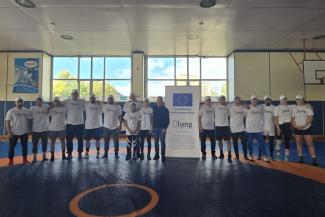PHOTOS: Bird, Beats, Beach and Wrestling in Dakar
Sunday, June 23, 2024 - 08:31 By Vinay Siwach

DAKAR, Senegal (June 22) -- Wrestling in Senegal? Nothing new to the country. It is the most popular sport, at least the traditional one. The stands are filled, music blaring, wrestlers are superstars in the country and people love it.
The second edition of the African Championships in Beach Wrestling traveled to Dakar, Senegal. More than 100 wrestlers entered to compete for the glory of becoming the champion of the continent.
But there is so much to wrestling in Dakar outside the two rings on the sand. The colors, music, cheering, dance and crowd are inseparable.
Obviously, there is wrestling with big throws, tackles, takedowns.
 Photo: United World Wrestling / Helena Courtis
Photo: United World Wrestling / Helena Courtis
Wrestling remains the same. Mat, sand, mud, ice. Those throws are supreme. Here's an example.
 Photo: United World Wrestling / Helena Courtis
Photo: United World Wrestling / Helena Courtis
Once you get thrown like that, you will be covered in sand. So you need to wash it. We got water right next to the rings.
 Photo: United World Wrestling / Helena Courtis
Photo: United World Wrestling / Helena Courtis
Outside the sand rings, no one should be that serious in wrestling. No way in beach wrestling. Come on, Mouhamed BAYO (SEN).
 Photo: United World Wrestling / Helena Courtis
Photo: United World Wrestling / Helena Courtis
We managed to convince him. Look at that flex. Thanks, Bayo!
 Photo: United World Wrestling / Helena Courtis
Photo: United World Wrestling / Helena Courtis
The National Arena de Lutte in Dakar came prepared. The traditional Senegalese wrestling begins with the sounds of drums. There was no other way to begin during the opening ceremony at Beach Wrestling. Adding to the drums, some colors and music. Nothing better.
 Photo: United World Wrestling / Helena Courtis
Photo: United World Wrestling / Helena Courtis
At all wrestling venues, a battle ensues. It's between the wrestlers and security. Are the wrestlers more well-built or the policemen? We will let you decide.
 Photo: United World Wrestling / Helena Courtis
Photo: United World Wrestling / Helena Courtis
Back to wrestling. Do you think this is a point?
 Photo: United World Wrestling / Helena Courtis
Photo: United World Wrestling / Helena Courtis
Thankfully, you are a referee only by looking at the screen in front of you. On the sand, our referees need to be as quick, both with their decisions and stepping away from the line of action.
 Photo: United World Wrestling / Helena Curtis
Photo: United World Wrestling / Helena Curtis
If someone mentioned a story about how a wrestler in Dakar managed a bird to sit on his head with no trouble, no one would believe that. But here you are, a wrestler in Dakar with a bird sitting on his head. Our photographer captured it so we have to believe.
 Photo: United World Wrestling / Helena Courtis
Photo: United World Wrestling / Helena Courtis
In the end, it is about being happy after watching wrestling. These kids surely enjoyed it.
Well, if you are looking for the results from the matches, here's the link for all the results. CLICK HERE


Share your thoughts.
Comments